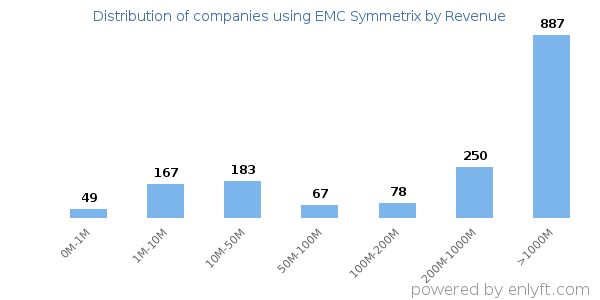Companies using EMC Symmetrix
We have data on 1,475 companies that use EMC Symmetrix. The companies using EMC Symmetrix are most often found in United States and in the Information Technology and Services industry. EMC Symmetrix is most often used by companies with >10000 employees and >1000M dollars in revenue. Our data for EMC Symmetrix usage goes back as far as 9 years and 4 months.
If you’re interested in the companies that use EMC Symmetrix, you may want to check out NetApp Storage Systems and HP Storage Systems as well.
Who uses EMC Symmetrix?
| Company | Mohawk Industries, Inc. |
| Website | mohawkind.com |
| Country | United States |
| Revenue | >1000M |
| Company Size | >10000 |
| Company | Globant |
| Website | globant.com |
| Country | Luxembourg |
| Revenue | >1000M |
| Company Size | >10000 |
| Company | SAP SE |
| Website | sap.com |
| Country | United States |
| Revenue | >1000M |
| Company Size | >10000 |
| Company | Cision |
| Website | cision.com |
| Country | United States |
| Revenue | 200M-1000M |
| Company Size | 1000-5000 |
| Company | Accenture PLC |
| Website | accenture.com |
| Country | Ireland |
| Revenue | >1000M |
| Company Size | >10000 |
| Company | Website | Country | Revenue | Company Size |
|---|---|---|---|---|
| Mohawk Industries, Inc. | mohawkind.com | United States | >1000M | >10000 |
| Globant | globant.com | Luxembourg | >1000M | >10000 |
| SAP SE | sap.com | United States | >1000M | >10000 |
| Cision | cision.com | United States | 200M-1000M | 1000-5000 |
| Accenture PLC | accenture.com | Ireland | >1000M | >10000 |
Target EMC Symmetrix customers to accomplish your sales and marketing goals.
EMC Symmetrix Market Share and Competitors in Data Storage Hardware
We use the best indexing techniques combined with advanced data science to monitor the market share of over 15,000 technology products, including Data Storage Hardware. By scanning billions of public documents, we are able to collect deep insights on every company, with over 100 data fields per company at an average. In the Data Storage Hardware category, EMC Symmetrix has a market share of about 1.1%. Other major and competing products in this category include:
Data Storage Hardware
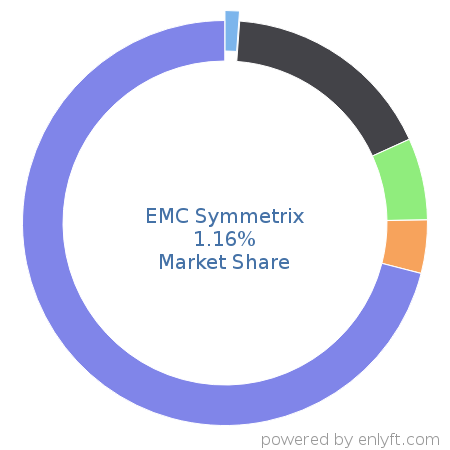

What is EMC Symmetrix?
The EMC Symmetrix DMX-4 delivers scalable capacity and performance to consolidate systems, applications, and/or hosts while maintaining high service levels.
Top Industries that use EMC Symmetrix
Looking at EMC Symmetrix customers by industry, we find that Information Technology and Services (18%), Financial Services (9%) and Computer Software (7%) are the largest segments.
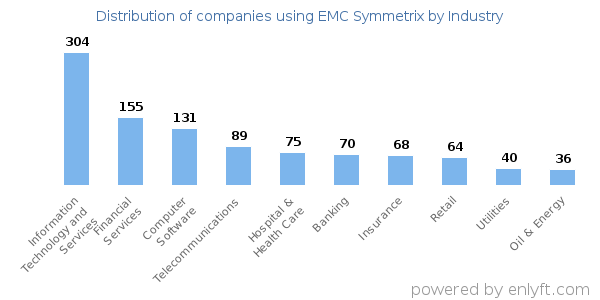
Top Countries that use EMC Symmetrix
69% of EMC Symmetrix customers are in United States.
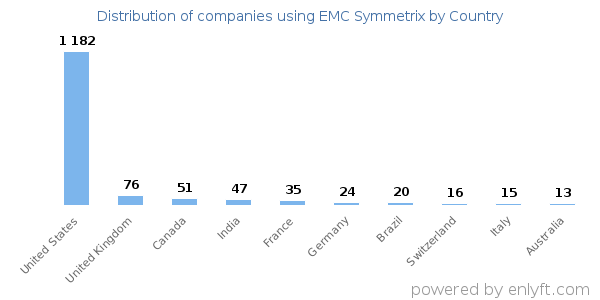
Distribution of companies that use EMC Symmetrix based on company size (Employees)
Of all the customers that are using EMC Symmetrix, a majority (62%) are large (>1000 employees), 13% are small (<50 employees) and 24% are medium-sized.
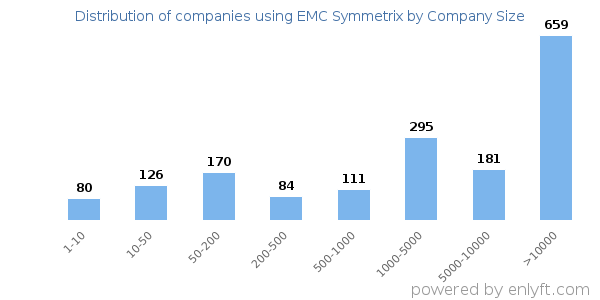
Distribution of companies that use EMC Symmetrix based on company size (Revenue)
Of all the customers that are using EMC Symmetrix, a majority (63%) are large (>$1000M), 24% are small (<$50M) and 5% are medium-sized.
